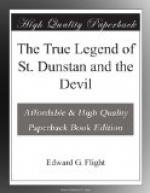A legal friend has volunteered an opinion, that certain supposed defects in the alleged deed evince its spuriousness, and even if genuine, its inefficiency. His words are, “The absence of all legal consideration, that is to say, valuable consideration, such as money, or money’s worth; or good consideration, such as natural love and affection, would render the deed void, or voidable, as a mere nudum pactum. [See Plowden.] Moreover, an objection arises from there being no Anno Domini, [Year Book, Temp. Ric. III.] and no Anno Regni, [Croke Eliz.] and no condition in poenam. [Lib. Ass.] Now, if the original deed had been thus defective, the covenanting party thereto is too good a lawyer, not to have set it aside.”
To these learned subtleties it may be answered, that the deed was evidently intended, not so much as an instrument effectively binding “the covenanting party,” as a record whereby to justify a renewal of punishment, in case of contravention of any of the articles of treaty. It would have been informal to make mention of money as the consideration, it being patent that this “covenanting party” considers it of no value at all. For however dearly all “good folk in Christendom” may estimate and hug the precious bane, as the most valuable consideration on earth, he, old sinner that he is, wickedly disparages it, as being mere filthy lucre, only useful horticulturally, to manure his hot-beds of iniquity. With regard to the consideration of natural love and affection, it is humbly submitted that the facts are at variance with such a suggestion.
Another friend, not of the legal, but the equestrian order, has tendered, according to his ideas, an explanation of the especial protecting virtue of the horseshoe. His notions are given as follows, ipsissimis verbis. “There is not in the whole world, a nobler animal than that splendid fellow, the horse. He is the embodiment of all that is magnificent, possessing strength, swiftness, courage, sagacity, and gracefulness. He never drinks more than he needs, or says more than he ought. If he were an opposition M.P.—and a horse was once a consul—his speech against Government bills, would be only a dignified neigh. Base and unworthy measures he disdains.




